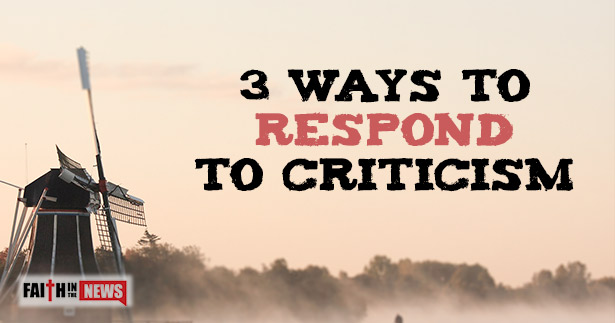How do you respond to criticism? Here are three ways every believer should respond to criticism.
Maybe they’re Right
Instead of getting angry when someone would point out an error or a sin I was in, I should thank them. Maybe they’re right. Shouldn’t we at least listen to them? Why not? It may be their way of saying, “I love you enough to tell you the truth.” I have acknowledged to others that when they point out something I’m doing wrong, I thank them instead of closing my ears to them. If I don’t listen to them, I miss an opportunity to grow. The Bible teaches that “A friend loves at all times, and a brother is born for adversity” (Prov 17:17), so remember that if your friend is correcting you, it’s because they love you. Telling your brother or sister the truth is one of the most loving things you can do, even when the truth hurts them.
Wounds of a Friend
The Bible cuts like a double-edged sword (Heb 4:12), but it cuts in order to heal, so in the same way, our friends may wound us by their correcting us, but remember, “Faithful are the wounds of a friend; profuse are the kisses of an enemy” (Prov 27:6). I would prefer the wounds of a friend telling me the truth than an enemy showering me with kisses, saying, “You’re alright.” Flattery is useless, but correction helps us to grow more into the image of Christ, and that’s our goal, isn’t it?
See it as Loving
God disciples every child of His, but not because He’s mad at them; it’s because He loves them (Heb 12:6). What parent wouldn’t discipline their own child in order to protect them or keep them from getting hurt? If there is no concern about discipline, can we really say that their parent really loves them? Love = discipline, but love – discipline = apathy (or, “I don’t care!”).
Conclusion
We can respond to criticism by shutting our ears and missing an opportunity to grow or by listening to them and learning from it. They might wound us with words, but if it’s done in love, its best for us anyway, so we should see our friends or other people’s criticism as being done in love (most of the time). Besides, I would rather be corrected than be incorrect. Wouldn’t you?
May God richly bless you,
Pastor Jack Wellman
Republished by Blog Post Promoter
 Faith in the News Christian News
Faith in the News Christian News



